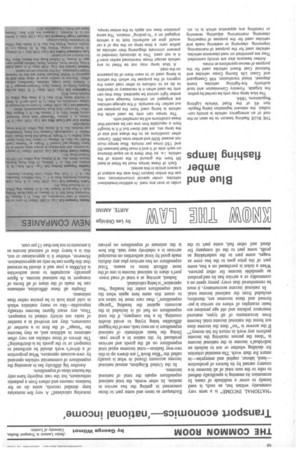THE COMMON ROOM
Page 60

If you've noticed an error in this article please click here to report it so we can fix it.
by George Wilmot 'University of London.
;Senior Lecturer in Transport Studies,
Transport economics 'national income'
"NATIONAL INCOME" is a term very commonly written but, as such, is used loosely to cover a multitude of cases. In economics its meaning is specifically defined to refer to the sum total of all incomes in a country earned by its factors of production —land, labour, capital and enterprise—in return for their work. The essential criterion for deciding whether or not to include an individual's income in the national income is "does the person receiving the income perform any work in return for his money?" If the answer is "no" then the income does not boost the national income total. Income from investments of all types, matured insurance policies and old age pensions are basic examples of where no service is performed and these incomes are, therefore, excluded from the national income total.
In national income accountancy, it must be remembered that every penny spent on a commodity or a service has its end product as spendable income for other persons. When a ticket is purchased on a bus, some part of the price goes to the bus crew as wages, some part to the undertaking as profit, some part to the oil company for diesel and other fuel, some part to the Exchequer as taxes and some part to those concerned in getting the bus service in motion. In other words, the total national expenditure equals the total of national incomes.
In the United Kingdom, annual national income accounts (found in what is usually called the "Blue Book") are drawn up in this two-way fashion—total incomes equal total expenditure on all the goods and services produced by the nation in a given year. Doing the basic arithmetic of national expenditure is no easy task, one of the biggest difficulties being trying to avoid double counting. In a bus company, if the total expenditure on fuel oil is included in the accounts against the heading "garage expenditure", than care must be taken not to count this same item again when the total expenditure under the heading "bus operation" is being calculated.
Indeed, arriving at a total of road transport's share in national income is one of the most difficult items to assess. Total expenditure on bus services plus any deficits made good by local authorities on municipal services is a relatively easy task. But how is the estimate of expenditure on private motoring calculated? A very few motorists keep detailed records, some do so for business reasons and others from a pedantic enthusiasm, but the vast majority have only the haziest ideas of expenditure.
Another big difficulty lies in assessing the expenditure of commercial vehicles operated by own-account operators. What proportion of a driver's work should be attributed to transport or to the goods he is distributing? The drivers of these vehicles are very often salesmen in addition and, as they become the "image" of the firm to a number of customers, they are involved in a number of tasks not strictly related to transport_ Thus, any exact figures become virtually impossible—like so many statistics which in cold print look to be precise rather than estimates.
Despite all these difficulties, estimates can be made of the share of all forms of transport in the national income. A figure generally acceptable to most authorities is £4,000m a year and it should be stressed that this figure can be only an approximation. However, whether it is approximate or not, this is a heavy slice of national income as it amounts to not less than 15 per cent.












































































































